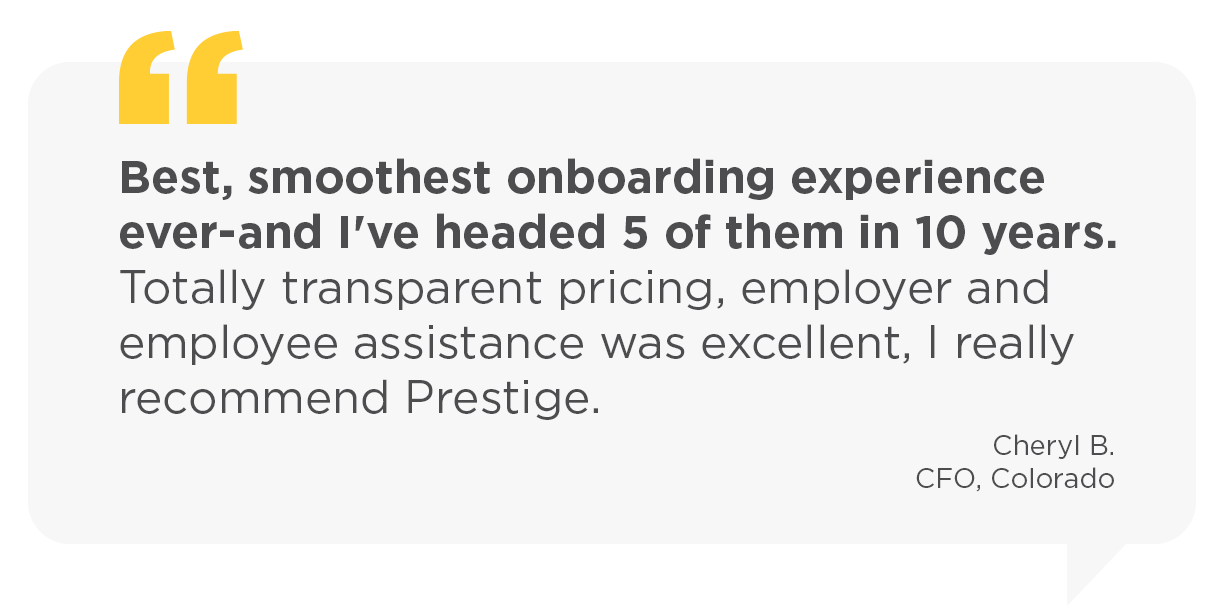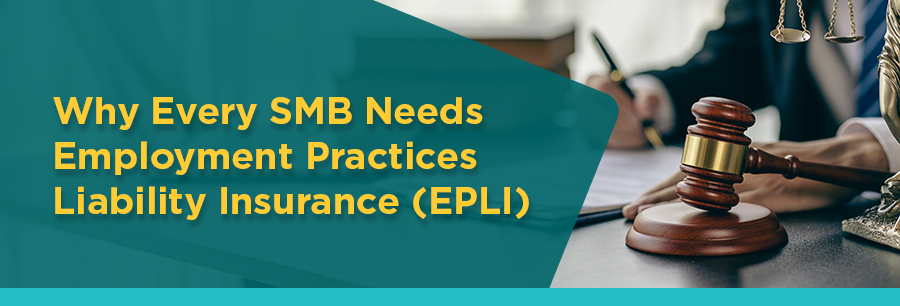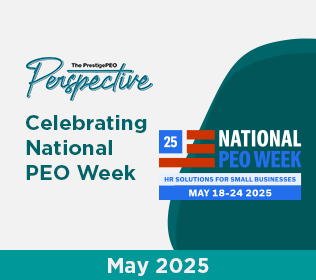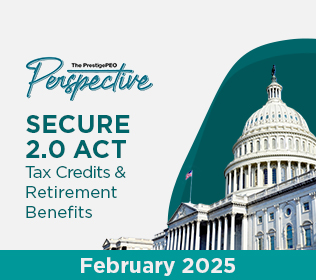

What’s Driving Costs and What Your Business Can Do About It
Healthcare costs are climbing, but more innovative strategies can help you stay in control.
In this month’s featured article, PrestigePEO’s VP of Benefits, Stacie Alvaro, unpacks what’s fueling the increase and what growing businesses like yours can do to manage expenses while offering competitive employee benefits.
Contact us to learn how we can help you support your employees’ financial futures and maximize tax benefits in 2025.

What Makes PrestigePEO Stand Out?
Our Clients Say It Best
Hear From the Businesses We Support
Don’t just take our word for it; hear how PrestigePEO makes a real difference for businesses like yours. From personalized support to powerful HR solutions, our clients share how partnering with PrestigePEO has helped them streamline operations, stay compliant, and confidently support their employees.

Time Theft is Costing Your Business More Than You Think
Spot Hidden Productivity Gaps and Protect Your Bottom Line
Time theft, whether through buddy punching, extended breaks, or inaccurate time tracking, can quietly reduce your SMB’s productivity and profitability.
In this blog, PrestigePEO breaks down what time theft looks like today, the real financial risks it poses, and how partnering with a PEO can help you prevent it with smarter systems and expert support.

COBRA Compliance: What Every SMB Needs to Know
Avoid Penalties, Stay Compliant, and Protect Your Business
COBRA coverage can be complex, but noncompliance can lead to steep penalties for your business.
In this blog, PrestigePEO breaks down your employer responsibilities, recent compliance trends, and how a trusted PEO partner can help you stay on top of deadlines, documentation, and legal obligations.

Breaking Down the One Big Beautiful Bill: What Employers Need to Know
Major Payroll, Tax, and Benefits Changes Are on the Way
The One Big Beautiful Bill, signed into law on July 4, introduces sweeping changes that will impact payroll, taxes, employee benefits, and compliance requirements for SMBs.
From tax breaks on tips and overtime to enhanced childcare credits and HSA expansions, this overview breaks down the key provisions affecting your business so that you can prepare now, not later.

New York’s Proposed AI Safety Law and the RAISE Act
New York is set to become one of the first states in the nation to regulate advanced artificial intelligence systems with its proposed AI safety legislation. This bill targets the development and deployment of so-called “frontier models,” which are extremely powerful AI systems that cost more than $100 million to train. These frontier models could potentially operate without human oversight and pose risks, including misuse in areas like biological research or cyberattacks.
Key provisions include requiring developers to maintain up-to-date safety protocols and report any “safety incidents” within 72 hours. Under the RAISE Act, these “safety incidents” specifically refer to events where the AI system causes harm, malfunctions, or creates serious risks. The bill also bans the release of models that pose significant risks. Enforcement will be managed by the New York Attorney General’s office and the Division of Homeland Security. Penalties for violations are strict, with fines up to $10 million for a first offense and $30 million for repeated violations.
While most small and midsize businesses are unlikely to develop such frontier AI systems themselves, the legislation could still impact your operations if you use or implement these powerful AI models within New York.
Beyond New York, several other states, including California, Massachusetts, and New Jersey, are also creating or passing AI-related rules focused on transparency, data privacy, and responsible AI use. These laws often require disclosures about AI involvement in products or services and set standards for protecting consumer data. Although these states’ laws differ in scope and enforcement, they show a broader trend of state-level AI regulation that employers should carefully monitor.
Employers should stay informed about these changing regulations, especially as advanced AI becomes more integrated into business activities.
As AI regulations evolve, small and midsize businesses must remain vigilant. Whether you’re using AI for recruiting, analytics, or customer engagement, the legal landscape is shifting and staying compliant is critical.
At PrestigePEO, we help businesses like yours stay ahead of complex employment and regulatory challenges, from HR tech trends to workforce compliance. Let’s start the conversation if you’re looking for a partner that simplifies compliance while supporting your growth.
Learn more about how PrestigePEO supports SMBs like yours, contact us today!

SCOTUS Issues Pivotal Employment Law Opinion
On June 20, 2025, the U.S. Supreme Court issued its opinion in the matter of Stanley v. City of Sanford, Florida, impacting how the Americans with Disability Act (ADA) is applied in the employment setting. The Court’s decision held that Title I of the ADA does not otherwise provide standing for claims of discrimination from retirees who do not hold employment at the time of the alleged discrimination.
The Court relied on the use of present tense grammar in the ADA’s statutory definition that protects “qualified individuals,” who are defined as a person “who, with or without reasonable accommodations, can perform the essential functions of the employment position that such individual holds or desires” to determine the extent to which these protections extend. The Court reasoned that the ADA protection does not extend to “retirees who neither hold nor seek an employment position at the time of the alleged discrimination.”
This ruling may limit the extent to which former employers may allege discrimination against prior employers for potential violations of the post-employment provision of benefits or other employment-related provisions.
As employment laws continue to evolve, your business needs a trusted partner to help reduce risk and stay ahead of compliance challenges. At PrestigePEO, our HR and legal professionals support SMBs with expert guidance, proactive alerts, and hands-on help navigating today’s changing employment landscape.
Let’s discuss how we can support your compliance needs and protect your business. Contact us to learn how!

The Supreme Court Rules to Limit Federal Courts’ Ability to Issue Universal Injunctions
In late June, the Supreme Court of the United States published its opinion limiting federal district courts’ ability to issue nationwide injunctions, which is anticipated to have reverberating impacts on multistate employers as a patchwork of compliance requirements evolves. The Court’s ruling held “universal injunctions likely exceed the equitable authority that Congress has given federal courts and that district courts cannot issue injunctions that, “are broader than necessary to provide complete relief to each plaintiff that has standing to sue.”
As we have previously reported, for decades, employers across the country have been impacted by the ability of federal judges to issue nationwide injunctions, or court orders, that, although stemming from a specific case, function to cease federal policy nationwide. These nationwide injunctions, or “universal injunctions,” have provided a blanket method for judicial rulings on matters that, despite involving a single group of litigants, have widespread policy implications. Recent injunctions have had significant employment-related impacts on matters such as overtime rules, salary threshold increases, COVID-19 vaccine mandates, Joint Employer standards, EEO-1 Component reporting, union election rules, the FTC’s non-compete ban, and Title IX regulations, among others. The use of nationwide injunctions has provided multistate employers with predictability and certainty as to the application of various federal policies.
This has all changed with the recent ruling on a set of Trump administration lawsuits that challenged three federal judges’ abilities to issue nationwide injunctions that block one of President Trump’s recent executive orders.
Critics agree that eliminating the ability of federal judges to issue nationwide injunctions would halt broad-based, nationwide policy decisions stemming from issues between litigants in one particular lawsuit and erroneously put a freeze on policy before an appellate court has the opportunity to weigh in on the matter.
Proponents of nationwide injunctions disagree and suggest that to eliminate federal judges’ ability to issue injunctions, the judicial capacity to provide relief in matters that may present issues of widespread policy misuse would be gutted. Others argue that these types of injunctions are critical as a facet of the checks and balances system of our democracy and keep governmental bad actors in check.
Employers should be cautioned that an end to nationwide injunctions will likely foster less predictability in the application of federal policies, resulting in an increased patchwork of regional compliance requirements that differ by federal circuit. It is also predicted to increase executive agencies’ ability to implement drastic policy shifts, despite localized legal challenges, and to increase the use of the class action method of litigation to impose broad injunctive relief.
As the legal environment grows more complex, SMBs need proactive compliance support and expert guidance to avoid costly mistakes.
PrestigePEO partners with businesses like yours to simplify compliance, monitor policy shifts, and provide timely updates on critical employment law changes.
Let’s discuss how PrestigePEO can confidently help you navigate these evolving challenges.




